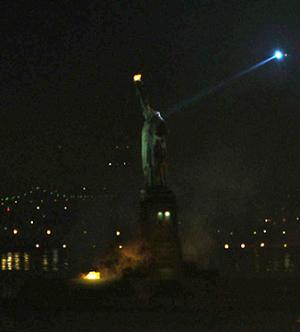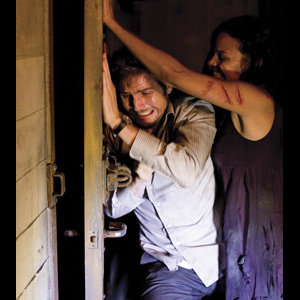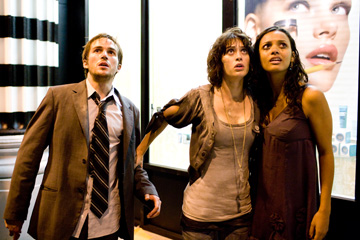Movie Review: Cloverfield
 | | Metaphor much? |
When Godzilla (a.k.a. Gojiro) first appeared on Japan’s silver screen in 1954, it was a success, not because it was a giant monster movie, but because it offered an outlet for Japanese fears about what had happened less than a decade earlier in Hiroshima and Nagasaki. Indeed, throughout the world, the anxiety surrounding nuclear warfare and proliferation were palpable enough to infiltrate all aspects of popular culture. Science-fiction, in particular, was so obsessed with the subject that it became a hallmark of the genre for decades to come.
Though Godzilla mutated into a series of whimsical films geared for children and then into the realm of the downright absurd, it was an important landmark in the history of film because of how effective it was in dealing with current events through the fantastic. It was no real surprise, therefore, that when Godzilla was reimagined in the United States right before the turn of the century in the embarrassing film by Dean Devlin and Roland Emmerich, it didn’t strike the same chord that the original had.
This year, less than a decade after 9/11, the United States has released its own giant monster movie in the same vein as Godzilla, but clearly different. Yes, a giant monster terrorizes a major city, and yes, the military comes in to try to destroy it. However, the similarities really end there, as Cloverfield is not interested in treading the same ground as its celluloid Japanese spiritual ancestor. In fact, Cloverfield has absolutely nothing to do with radiation or nuclear war.
 | | It's a good thing aliens still haven't figured out how to open doors |
What I think makes this new film important, despite the fact that no one aspect of the movie is exactly original, is that it deals with current events the way Godzilla did back in the 50’s, because Cloverfield, more than anything else, is about 9/11.
Everything about the movie, from the self-absorbed protagonists to the obvious symbolism of a headless statue of liberty, reflect American fears—both conscious and unconscious—following the attacks of 9/11. The fact that the film utilizes hand-held video footage (like The Blair Witch Project) and is set in New York with buildings crashing to the ground, spewing rivers of smoke and debris upon a panicking city populace, clearly calls to mind the images and emotions of the World Trade Center coming down.
That’s why Cloverfield is a brilliant success, and why it is such a powerful movie today, even though it is just a pulpy sci-fi movie about a giant monster and moderately good-looking twenty-something twits with ingeniously banal dialogue and uninterestingly ordinary problems.
The characters, despite their mediocrity (and how annoying they can be), are absolutely necessary for the film. They reflect a certain kind of decadent boredom that had infected the American psyche long before the turn of the century, but it was a happy boredom, one where the most difficult problems were relationships and job interviews rather than warfare or starvation. The young people who carry this movie had never dealt with real trauma, and their wholly realistic reactions to the events of the film show that.
 | | Notice the guy looking in the same direction as the woman in the ad behind him, while the girls look at the giant friggin' monster |
I won’t spoil much, but the threat itself—the giant monster—is actually fairly insignificant to the plot. It’s more of a force of nature that has little screen time, and the fact that it remains largely unseen for most of the movie reflects how the most terrible fears in the modern world—no matter how gargantuan they may be—are murky, made up of shadows and quick movements just out of sight. Also, for the record, it’s not that imaginative a beast; you’ve probably seen a dozen creatures similar to it.
Still, the film has several clever moments and a wealth of persistent imagery. Even the dialogue has its strengths; if nothing else, it’s completely believable. The special effects, directing, sound, and acting are all impressive enough to keep you sutured to the movie with suspended disbelief, even at its most ludicrous beats.
So, all in all, it’s an important movie, and I highly recommend you go see it.
-e. magill 01/28/2008
|
|